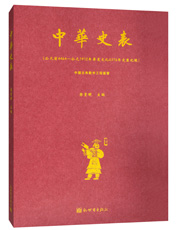|
 |
|
ANCESTRAL TRIBUTE: A ceremony is held to honor Huangdi, or the Yellow Emperor, in Huangling County, northwest China's Shaanxi Province, on April 5. Huangdi is a legendary hero said to be a common ancestor of the Chinese nation (DING HAITAO) |

A new book, Zhonghua Shibiao (literally, "A Chronology of Chinese History") traces Chinese history back to 4464 B.C., moving the starting point of China's historical chronology several thousand years earlier than what has been traditionally accepted. Luan Guiming, a research fellow with the Chinese Academy of Social Sciences and the book's editor in chief, along with Zhang Shilin, senior editor at the Beijing-based New World Press, which recently published the book, discussed their work in a special report for Beijing Review. Excerpts follow:
It has been a long-held norm, in an era which holds science above all else, to determine the origins of civilizations based on archeological findings. According to such criterion, the Tigris-Euphrates River Valley and the Nile River civilizations could have started around 3500 B.C., while the Aegean and Indus River Valley civilizations could have begun about 2500 B.C.
The Timeline of Chinese History in the authoritative Cihai dictionary identifies 841 B.C. as the start of recorded Chinese history. However, A Chronology of Chinese and Foreign History, compiled by Chinese historian Jian Bozan (1898-1968) in 1961, defines it as 2297 B.C. when the legendary Emperor Yao ascended to his throne as the start of Chinese civilization. Both versions allude to the fact that China has the shortest past among the major ancient civilizations of the world. Could that be true?
Returning to the records
In 1971, renowned Chinese scholar Qian Zhongshu (1910-98) expressed his suspicions that Chinese civilization began before 841 B.C., the first year of consecutive annual dating of China's history identified based on the Bamboo Annals, a chronicle written during the Spring and Autumn and Warring States periods (770-221 B.C.). He alerted Luan to the necessity of redrawing the timeline of Chinese history according to the Records of the Chinese Emperors, written by Huangfu Mi (A.D. 215-282). According to Qian, the mythological period of ancient China may be possible to prove. Following Qian's advice, Luan headed a research team to collect and sort out materials and conduct extensive research, taking advantage of the Digitization Project of Ancient Chinese Books and referring to numerous classical documents including the aforementioned works. Finally, Zhonghua Shibiao was published this year after 30 years' strenuous work.
The book dates Chinese history back 6,477 years to 4464 B.C. or the time of Suiren, the discoverer of fire and one of the Three Sovereigns according to Chinese legend. It draws on the archeological discoveries of the Peiligang Culture (8,000 years ago), the Yangshao Culture (5,000-7,000 years ago), the Liangzhu Culture (6,000-7,000 years ago), the Hongshan Culture (5,000-6,000 years ago) and the Dawenkou Culture (4,400-6,300 years ago). The book challenges the long-established view that the period before the Shang Dynasty, which could have started around 1500 B.C., was not well founded and looks to prove that Chinese civilization has existed for more than 6,000 years.
|
